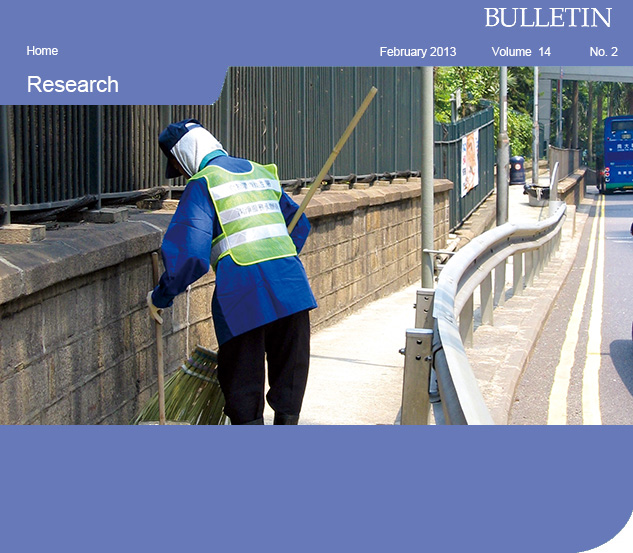| Trade and Inequality | |
| Trade and opening up to China have fuelled Hong Kong’s phenomenal economic success in recent decades, but they have also left greater inequality in their wake. |

|
|
Hong Kong’s open port and free trade economy have often been touted as the secrets to its economic success. Over most of the last decade, as trade with the world has become freer, the city has experienced strong economic growth and low unemployment. But there has been a downside to this: Hong Kong has one of the highest rates of inequality among highly-developed economies, according to the UN Human Development Report. Why is there this disparity? An HKU report commissioned by the Asian Development Bank (ADB) offers some answers. It is part of a global series of reports that aims to improve understanding about the relationship between trade and unemployment around the world. Dr James Vere, of the School of Economics and Finance, conducted the Hong Kong study and says the picture here has been complicated by more than just freer global trade. The opening up of China, which is also intertwined with trade issues, has had a significant impact on employment. Job growth does not always mean improvement As manufacturing jobs moved across the border in the 1980s and 1990s, there were fewer opportunities for lower-wage workers. These workers fell into low-level service jobs, such as estate management and cleaning, restaurant work, and retailing, that paid very poor salaries compared to what they had earned in manufacturing and confined them to serving Hong Kong residents rather than the export market. In contrast, high earners, especially in growing export sectors such as financial services (in terms of GDP share) which were benefiting from China’s opening, reaped huge benefits. Between 2004–10 they saw wages increase by 10 per cent. But those in sectors that were growing only in terms of employment saw wages fall two per cent. Cheap labour may have created employment but it did not improve the lot of these workers. “The mere fact that a sector is adding jobs does not necessarily imply that workers in that sector are doing well,” Dr Vere says. |

|
“The mere fact that a sector is adding jobs does not necessarily imply that workers in that sector are doing well.” |
|||
| Dr James Vere | ||||
|
Little relief for low-skilled workers Many of the displaced low-skilled workers have minimal education but a number of them are still in their 40s or 50s, meaning they have many years of economic activity ahead. “Though free trade has been a boon for higher-skilled workers, who now enjoy greater demand for their services from the global market, it has been quite negative for lower-skilled workers who now compete with an overwhelming supply of labour from China. There is still a sizeable chunk of workers who don’t even have secondary school education.” “Given that there is no obvious source of potential demand for low-skilled workers, it seems unlikely that these circumstances will change in the near or medium term.” Efforts to further open opportunities with China have not helped this group. The Closer Economic Partnership Arrangement (CEPA) signed with the Mainland in 2003 has created jobs equivalent to one per cent of Hong Kong’s labour force, but not for those on the low end of the earnings ladder. Minimum wage legislation introduced in 2010 is also not expected to be much help over the long term. Dr Vere has done extensive work on this issue separate from the ADB study and notes that it places a disproportionate burden on a relatively small number of employers, who may end up turning to less labour-intensive production methods in the future to save money. China’s own economic development could create further pressures in the future. The country is moving up the value chain and, while Hong Kong currently has an advantage in providing services, it cannot be assumed this situation will continue. |
 The statutory minimum wage was implemented in Hong Kong in 2011 and has just been adjusted from its prevailing rate of HK$28 to HK$30 per hour; the revised rate will come into force on May 1, 2013. |
|
Best to be flexible “The main trend Hong Kong has to be worried about is the increased competitiveness of China and trying to stay one step ahead to carve out a niche for ourselves. In terms of employment policy, there is not whole lot we can do. Government-directed changes in occupational structure tend not to work,” he says. “The best we can do is to keep our economy flexible and be able to respond to changes. Generally, in terms of education, we need to make sure our graduates can do a lot of different things. And we want to make it as easy as possible for people to start up and wind up businesses.” Free trade, though, remains an important and inescapable part of Hong Kong’s development story, despite the ups and downs for workers. “Hong Kong as a whole has been well-served by its liberal trade regime. Free trade is not negotiable,” Dr Vere says. “But if we want to look at the effect of trade on employment in Hong Kong, it’s really a story of how Hong Kong has responded to the opening up of China. Our manufacturing jobs may have gone across the border but we have also been given opportunities to provide services there. It’s a two-way street but there are consequences and we have to think about how to address them.” |
| Back | Next |